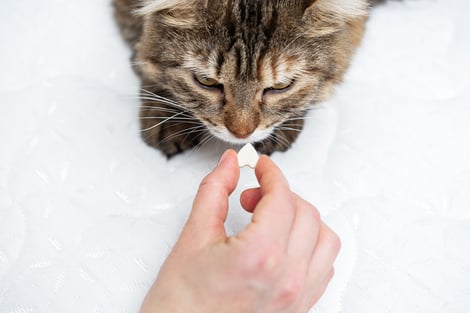What Are the Best Vitamins for Cats? Do They Even Need Them?

You know the old adage about cats living nine lives? That’s debatable. But records show that some cats have lived a long, long time. Creme Puff, a cat in Austin, Texas, died at age 38 years, 3 days.
I wouldn’t expect your cat to live as long as Creme Puff, but we want to make sure that your cat lives their best, healthiest life.
Should you give vitamins (or other supplements) to your cat? Where should you get them?
What Are Vitamins?
I’m sure you’ve heard of vitamins, but what are they? They are organic molecules (i.e., they contain carbon atoms) that are necessary for essential health functions in the body.
Pet parents who want to feed their cats the best diet ever may be tempted to add vitamins and other supplements to their diet on their own. While vitamins are necessary in their diet, giving your cat too many vitamins can cause health problems.
Where Should You Get Vitamins?
Before you go looking for vitamins for cats, take note that the American College of Veterinary Nutrition says that most animals do not require supplements, including vitamins, if they are eating a “complete and balanced commercially available pet food.” The exception, of course, is if your veterinarian prescribes a supplement for a particular health problem.
If your vet does prescribe a vitamin or other supplement, only choose reliable sources that they recommend. Beware of internet sources or social media ads for vitamins or other supplements. They may sell counterfeit products that at best may do them no harm, but your wallet and your cat may suffer from these bad products. There are several databases where pet parents can find reliable information. For example, www.consumerlab.com reviewed joint health supplements for pets.
Companies making animal supplements are not really regulated by the Food and Drug Administration, so companies can make a lot of claims that aren’t based on science. That’s why it’s always a good idea to consult a veterinarian — or a veterinary nutritionist — before giving a vitamin or other supplements to your cat.
Nutrition Is Key
A balanced, healthy diet is even more important than vitamins or other supplements for your cat. The Cornell Feline Health Center has some great information on nutrition for cats. They explain that cats are “obligate carnivores,” meaning their bodies need nutrients that are found in animal products. Their wild relatives hunted for prey that is chock full of protein, with some fat and carbs. So, quality pet food mimics those proportions and also includes vitamins, minerals, fatty acids, and amino acids.
Cornell also has some tips on choosing healthy food for your cat.
- The most affordable cat food is dry food (kibbles), but make sure to not use the food after its expiration date because it can lose nutritional value. Store kibble food in the bag it came in, and store it in an airtight container in a cool, dry place.
- Semi-moist food has a mid-range cost. It has about 35% moisture, but it can dry out or become rancid after the package is opened.
- Canned food has at least 75% moisture, which is good for cats. Read the labels and talk to your vet to make sure you’re getting high-quality food.
For pet parents with tight budgets, I’d recommend a complete and balanced diet that your veterinarian believes will be healthy for your cat’s age, lifestyle, and body weight (or body condition score).
Commercial pet food companies that work with veterinary nutritionists make high-quality pet food. Sometimes these companies sell more affordable pet food brands because they manufacture their own pet food.
When shopping for cat food, look for foods that have meat, meat byproducts, or seafood as the first ingredient.
A lot of cats are overweight or obese, so limit treats and ask your vet about how much you should be feeding your cat.
Common Cat Vitamins and Supplements
We agree with PetMD that most cats don’t need any supplements, including vitamins. If you are feeding your pet a commercial pet food that was developed using feeding trials monitored by veterinary nutritionists, you chose wisely. That means they are actually feeding their food to cats and evaluating their health over time.
Kittens and older cats have special dietary needs, so look for food made for your cat’s life stage. The label on the food container should let you know the recommended age range for that product.
If your cat is eating a healthy and balanced diet, she may still have some health conditions that may arise. Your veterinarian should be able to identify common health problems with regular checkups. In this case, your vet might also recommend a vitamin or other supplement for certain health problems they identify.
- Studies show that older cats with dementia (or cognitive dysfunction) can benefit from antioxidants like vitamins E and C, which are good for brain health.
- Glucosamine and chondroitin help maintain healthy joints by preventing arthritis, or at least slowing it down.
- Omega-3 fatty acids like fish oil help the skin, joints, and organs.
Veterinary Nutritionists
If your cat has a serious health issue, your vet might refer you to a veterinary nutritionist. These specialists make sure pet parents are finding the right foods and supplements.
Cats with the following health problems may especially benefit from seeing a veterinary nutritionist:
- Urinary stones
- Gastrointestinal disease
- Kidney disease
- Obesity
- Food allergies
- Eating disorders
We Are Here to Help
We all want our cats to be healthy and happy, no matter how many lives they actually live.
The good news is that most healthy cats don’t even need vitamins if they are eating a balanced diet. If your cat has special dietary needs or a health problem, your vet is the best source for information.

